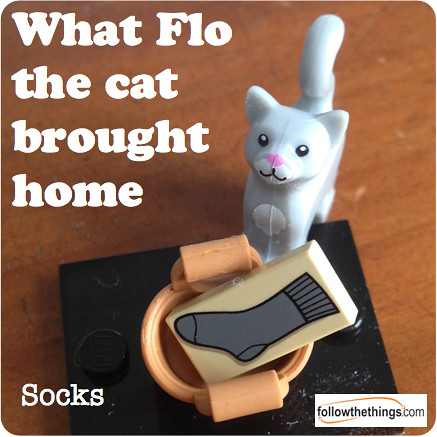Fashion
Socks

Year: 2006
Author: David Roberts
Type: undergraduate coursework, University of Birmingham, UK.
Availability: in full, below.
Page reference: Roberts, D. (2006) Socks. followthethings.com (www.followthethings.com/socks.shtml last accessed <insert date here>)
Shopping Cat photo
For more about Flo the Cat, see our blog post here.
Original
Verrucas, dirt, cold, pain. Whenever I am barefooted, unpleasant things tend to invade my feet, and that’s why I like socks. They are barriers to my discomfort; I am secure, safe in their company. Yet, I do seem to like them a little too much. They take up a whole drawer in my room after all. I can’t imagine life without them.
But socks are strange beings. In improving my life, offering comfort, warmth and protecting me against disease, they seem to have sacrificed their own identities. They are the only free item of clothing I have; free from tags, labels or any clues to their origin or even what they are made from. I have to delve deeper, literally, into my bin and retrieve the packet before I can make out that they were “Made in Bulgaria”. By buying them in my local Marks & Spencer store in London, I became part of an intricate and wide reaching network of people and machines.
In purchasing these socks, I was one of 15 million customers in one of 400 M&S stores in the UK that employ 65,000 people (Anon 2005). The socks that ended up on the checkout conveyor-belt are part of the countless number transported from a factory in Rousse, Bulgaria, packaged by automated production lines and made by over 600 workers (Anon 2002) who knit, sew, seam, bleach, iron, shape and sort my socks assisted by 200-needle single and double cylinder machines (Anon nd). Not to mention the thousands of workers in Bulgaria involved in manufacturing the polyamide and elastane lycra, the farmers planting, tending to and cultivating the cotton plants, and those getting these and other materials to the factory.
This simple transaction links me with hundreds, thousands, millions(?) of people across the world. If my socks could become more than mere garments – sock puppets! – who could talk, what would they tell me about the conditions, education, wealth, future of the people involved in putting them on my feet (Cook et al 2006)? This transaction links me to more than just individual people.
The factory in Bulgaria is owned by Delta Socks, an Israeli company contributing to hundreds of job losses in the UK (Anon 1999), but fighting its own battles against boycotters who have identified how its Israeli factories benefit from operating on illegally confiscated Palestinian land by employing labourers in dreadful non-unionized conditions (Scheid, 2002). The headquarters of these sock boycotters are located in London, just a couple of Tube stops away from the M&S I bought them in.
Putting my foot into the oh-so fluffy, comforting sock, it seems I’m helping to perpetuate the Arab-Israeli conflict, to disrupt the lives of hundreds of fellow Brits, and to contribute to the lives of thousands in Bulgaria. Who lives, dies, profits or suffers, depends, in a small part, on me. My socks have spoken, and what they have said matters. Oppression doesn’t sit well with me. And what I do with my money. I can change what socks I buy. I must change. Sacrificing quality for ethics is a small price to pay. I may be just one person, but what I do makes a difference. To a lot of people. In a lot of different places.
But I’m not the only one that can or should act differently. Surely. This can’t all be my responsibility. As a consumer. Others are shaping my options. They have to change too. Including M&S bosses, and the people who decide what socks get onto their shelves. A new range of fairtrade cotton socks has just started to appear there (Anon 2006a, 2006b). Would you believe it? Their marketing pitch was ‘Your M&S: Look Behind the Label’! Just what I was doing. Their cotton is grown by farmers in Gujurat, India. It’s good for them. But what about those sock workers in the UK, Bulgaria, Israel / Palestine (O’Nions 2006)? What ‘good’ has this done them? And what should I do with the socks I’ve already got? The ones lying in my drawer? Put them on, as usual. I suppose. For a run this morning. Then to walk into Uni…
References
Anon (nd) Added Value: Manufacturing: Socks. Delta Galil (www.deltagalil.com/ last accessed 18 January 2006).
Anon (1999) Business: The Company File ‘King of Socks’ leaves UK. BBC News 29 October (http://news.bbc.co.uk/1/hi/business/the_company_file/492722.stm last accessed 10 February 2011)
Anon (2002) Sock it to M&S. The Sofia Echo, 19th December (http://sofiaecho.com/2002/12/19/632132_sock-it-to-ms last accessed 10 February 2011)
Anon (2005) Annual review. London: Marks & Spencer. (http://corporate.marksandspencer.com/investors/reports_publications/2005 last accessed 10 February 2011)
Charles O’Nions (2006) Beyond Fair Trade: Fair Trade and Global Justice. Red pepper 22 April (www.organicconsumers.org/articles/article_420.cfm last accessed 10 February 2011)
Kirsten Scheid (2002) Popular boycott of supporters of Israel – FAQS. Jews For Justice For Palestinians(http://jfjfp.com/ last accessed 18th January 2006)
Published in:
Cook, I., Evans, J., Griffiths, H., Mayblin, L., Payne, R. & Roberts, D. (2007). ‘Made In… ?’ Appreciating the Everyday Geographies of Connected Lives?. Teaching Geography (Summer), p.80-83 (www.youngpeoplesgeographies.co.uk/download/YPG_TGSum07Cook.pdf last accessed 16 January 2011)
Posted by Ian Cook (last updated February 2011). Page created as coursework for the ‘Geographies of material culture’ module at Birmingham University. Reproduced with permission of the author.


